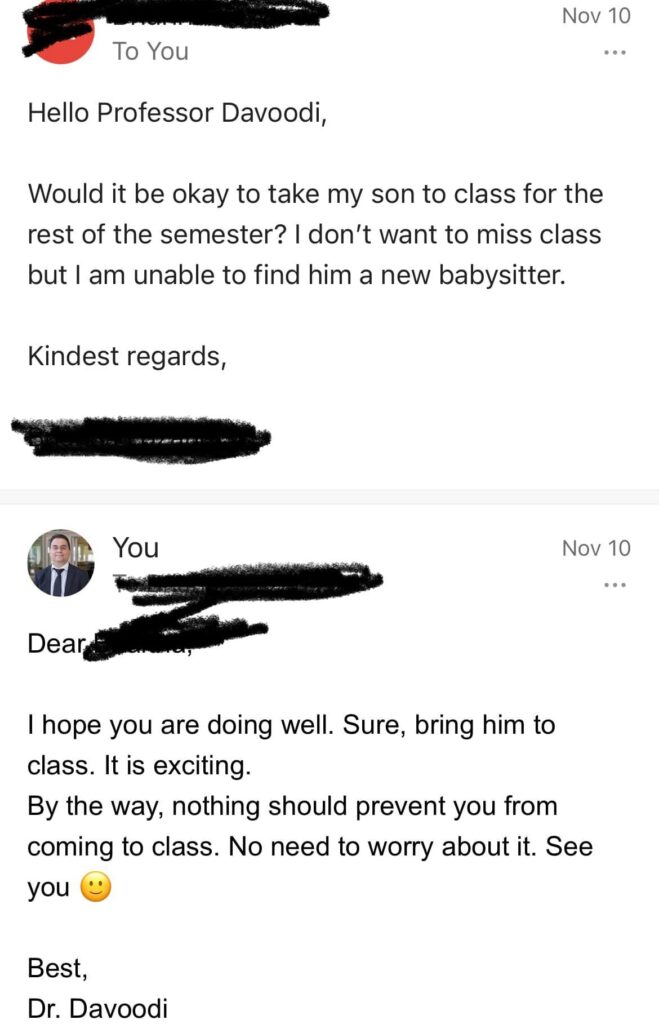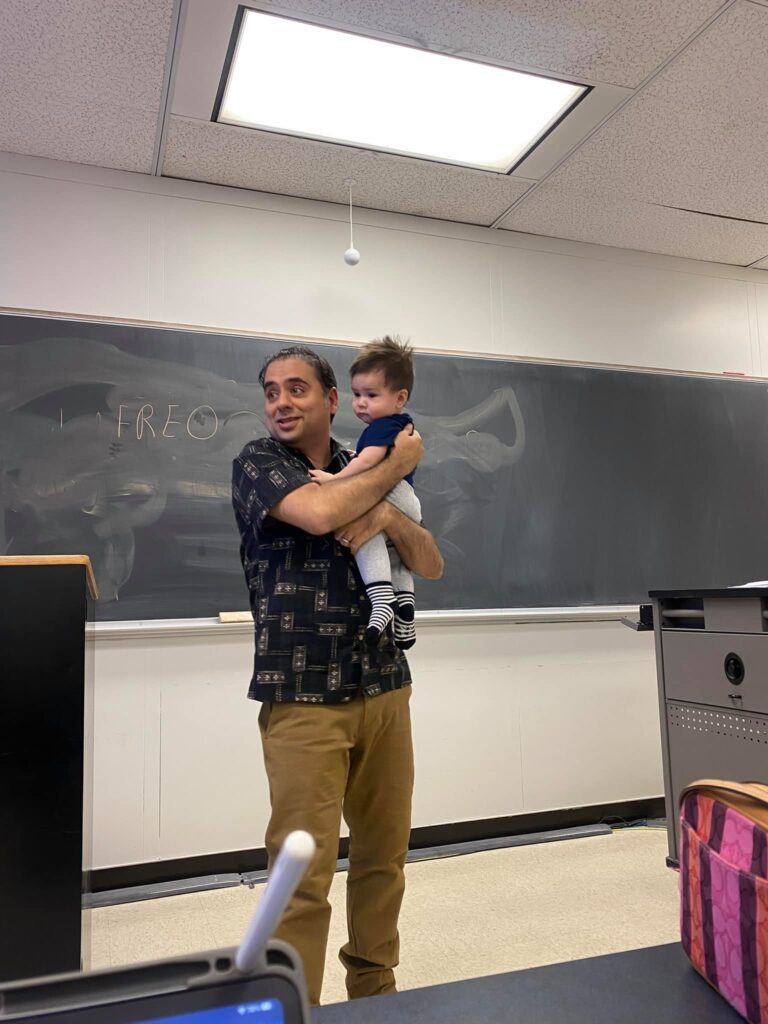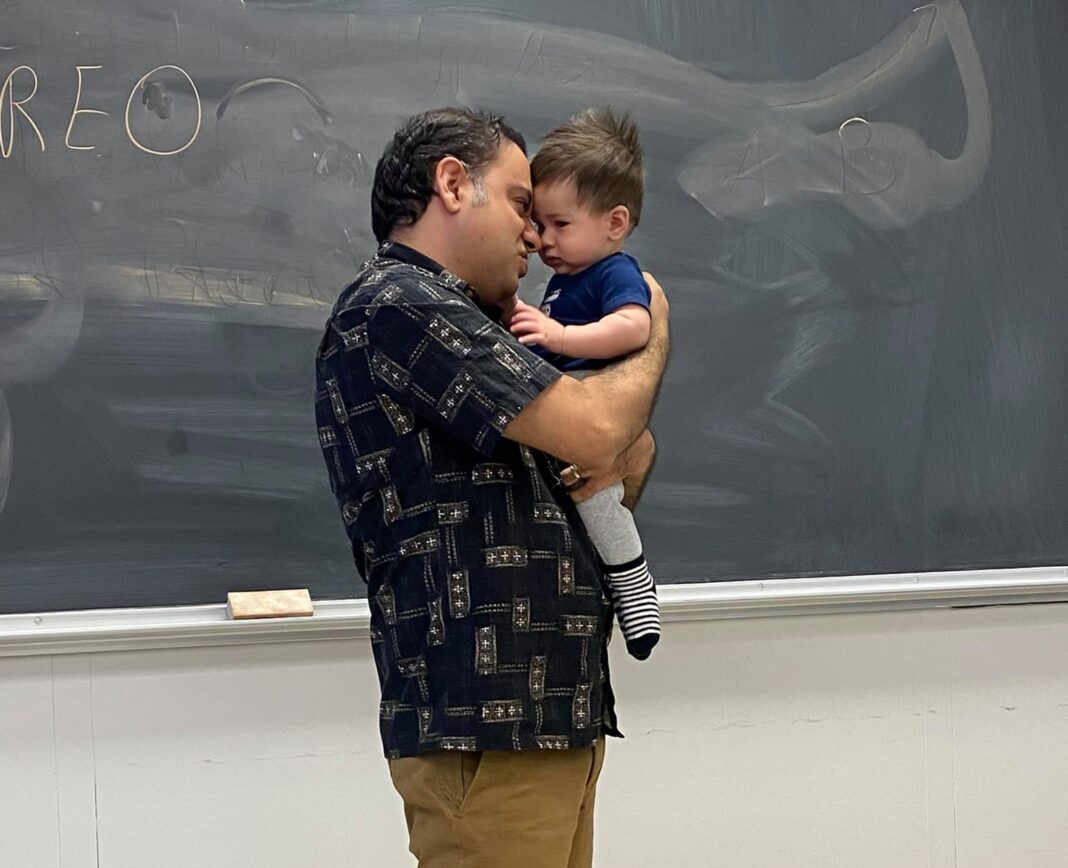To help out one of his students, University of Texas Permian Basin Assistant Professor of Bilingual and ESL Education Amin Davoodi allowed one of his students to bring her baby son to class.
It may have seemed like a small gesture, but to Brianna Lozano it meant a lot. She didn’t have a baby sitter and she didn’t want to miss class.
Davoodi said she emailed him one day and said she wanted to come to class, but didn’t have a babysitter to take care of her 6-month old son and it would be that way for the rest of the semester.
UTPB Communications Manager Alexa Dunson said the university doesn’t have a specific policy about bringing children to class, and it’s never been an issue.
“We do have a daycare available on campus for our students and we also have very understanding faculty who know that life happens. We always encourage our students to talk with their professors, it’s one of the greatest things about this University, close relationships, and lots of support,” Dunson stated in an email.
The daycare center cares for children from 18 months to 5 years old.
Davoodi told Lozano not to worry.
“… Nothing should stop you from continuing your education. She was so happy, and for that reason I’ve posted this screenshot of our email exchange just to inspire new teachers to go beyond the classroom and help their students on LinkedIn, which is a professional (networking site). It went viral. Last time I checked, 66,000 people all around the world have seen that. That’s how it started. She came to class with the baby. I also have a son who is one month younger than her son. … He was a good baby. He was smiling all the time …,” Davoodi said.

He held the baby while she took notes and he continued teaching for 30 minutes and then gave him back to her.
“Apparently some of my students took some photos and then they shared those with me, so I attached it to the post that I was sharing on social media and it went viral. It’s the Internet world,” Davoodi said.
A couple of days before, he posted the class grades. Lozano was the top student in his class.
Davoodi said Lozano was so happy because she didn’t have any other options.
“When you’re a good student you don’t want to miss a class, so that was hard for her to decide what she needed to do. But I’m so glad that she communicated with me. … ,” Davoodi said.
He added that other students might never have told him what their dilemma was.
“I’m happy she decided to reach out to me,” Davoodi said.
Most students at UTPB are first-generation college students and have jobs and families, he said.
“So just imagine as a first-generation student you have all these dreams and everything, but because of things like this you may not be able to perform well. So if you don’t help them, they may lose that once-in-a-lifetime opportunity,” Davoodi said.
“It’s really important for us as educators to go beyond the classroom … (to) be accessible and be understanding. At the end of the day … we need to be kinder, generally, to one another. A lot of the issues that we have, we will be able to solve them with just kindness,” he said.
Lozano said she was a little scared to tell Davoodi about her situation, but when he told her she could bring her son to class and he could learn something along with her, she was thrilled and it took a load off her mind.
“… So we got him ready and just packed some toys and his bottle just in case he got hungry and he loved it …,” Lozano said.

She added that she wants to teach freshmen or sophomores in math or social studies. Eventually, she would like to be a principal.
Lozano has lived in Odessa for 11 years, but is from Winter Haven, Fla.
As a youngster, she said all her teachers had special qualities in how they would interact with the students.
“… I think it was in third grade I knew I wanted to be a teacher because my elementary teacher, she was just so attentive and that’s why I started loving math because she just made it so fun,” Lozano said. “You wouldn’t think that math is a subject that anybody would like (but) all the projects we would do they were really nice and it was just the fact that she explained it and it wasn’t just thrown at us.”
This was Davoodi’s first semester at UTPB. He graduated in August from Texas A&M University in College Station and started the job as an assistant professor of bilingual and ESL (English as a second language) education.
According to statistics from the U.S. Department of Education, all 50 states have a teacher shortage, and specifically bilingual teachers.
“So it’s a national issue (the) teacher shortage in this country. So we are trying to produce as many quality teachers as possible at least for the state of Texas. That’s what we’re doing in the teacher preparation program.”
He came from Iran in 2016. He got his undergraduate degree and master’s in his home country. Ethnically he is Kurdish.
“We are the largest ethnic minority in the world without an independent country,” Davoodi said.
He added that there are Kurds in Iran, Iraq, Syria and Turkey.
“So 2016, my wife and I, we applied for four different American universities and we got admitted, both of us in the same PhD program, curriculum and instruction PhD at Texas A&M. Then we needed to get a visa and it wasn’t fun because the U.S. doesn’t have an embassy in Iran obviously so we had to go to Dubai and Romania and we had to go there three times because the first time we didn’t get the visa, the second time didn’t get it. So it’s hard for Iranians to get (a) visa. … then we got the visa and came to the U.S. in 2016, finished our PhD in five years …”
Since then they have had two children. Their daughter is 2 1/2 and their son is 6 months. His wife is an adjunct at UTPB in the same program.
They speak Persian, Kurdish ad English.
In the 2019-2020 academic year they got a position as a visiting researcher at Pennsylvania State University and lived there for a year. But Texas has largely been their home in the U.S.
“We came here with some knowledge about it, but obviously firsthand experience is something else.”
When he was coming to Odessa everyone was telling him he was going to the desert.
“And then I come from the Middle East, so desert to me is desert; desert with camels and stuff, so I was expecting that,”
His GPS was counting off the minutes until he would get to the desert, but he saw no camels.
“It is less gentle let’s put it that way than College Station, but with an American standard it seems that this was called a desert. So that was interesting,” he said.




